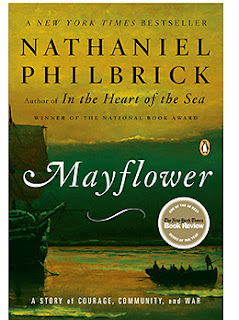
Given that Thanksgiving is next week, it's timely that I finally finished reading Nathaniel Philbrick's "The Mayflower." Given Philbrick's background in Maritime history, I thought it would focus more on the period of time leading up to the Mayflower's departure from England and the voyage itself. Instead, that didn't even encompass a third of the book. In fact, it seemed like half the book was focused on King Philip's War and the events leading up to it.
After having read Philbrick's "In the Heart of the Sea" a few years ago, I knew going into it the guy had what it takes to turn a historical narrative into a readable story. I wouldn't quite put him at the level of Stephen Ambrose yet, but he's pretty close.
Here are some of my quick takeaways:
- The Pilgrims' desire to have the freedom to practice their religion was discussed at length in the beginning but was only touched upon briefly throughout the rest of the book.
- I never realized the original destination of the Mayflower was the Hudson River.
- Philbrick portrays Myles Standish's unprovoked raid of the Wessagussett Indian settlement as having "irraparably damaged the human ecology of the (plymouth) region."
- King Philip's War was a bloody one that resulted in more colonist deaths than was ever discussed in my college Colonial history courses.
- King Philip's War may have dragged on much longer if not for the heroics of Benjamin Church. While there were probably many other aspects of this Indian vs. Colonists nearly two year battle that were not captured in the book, Philbrick focused on Church's battles and his pursuit and ultimate capture of Philip. Philbrick portrays him, he's very much the type of hero someone could probably develop a screenplay around. Primarily because of his trust in the Native Americans and willingness to form alliances with them at a time when other colonists refused to and would kill any and all they came in contact with.
No comments:
Post a Comment